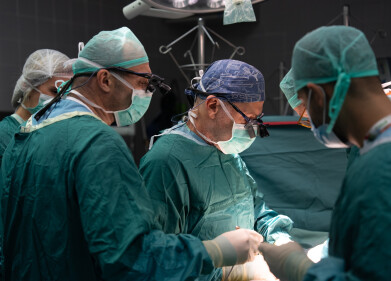News
Minister Launches Next Generation of Supercomputers for UK Researchers
Apr 11 2012
If every person on the planet were able to carry out 250,000 calculations per second simultaneously, this would be the combined capability of the new stage of development of two giant computers, HECToR and BlueGene/Q, based at the University of Edinburgh's Advanced Computing Facility (ACF).
Funded by four of the UK Research Councils, EPSRC, STFC, NERC and BBSRC, the increased computing capacity and performance of these computers will help UK researchers' work in forecasting the impact of climate change, the fundamental structure of matter, fluctuations in ocean currents, projecting the spread of epidemics, designing new materials, the structure and evolution of the universe and developing new medicinal drugs.
At the launch of the next phase of development at an event jointly hosted by the University of Edinburgh and the UK Research Councils, Minister for Universities and Science, David Willetts, said: "E-infrastructure is fundamental to modern research and development. It helps our world-leading science base achieve breakthroughs across a range of important disciplines and helps industry design and manufacture new products. These impressive new supercomputers will drive growth and innovation. They will provide UK businesses and researchers with the technology they need to compete successfully on a global scale."
Both the BlueGene/Q and HECToR facilities have approximately the same computational performance, 800 Teraflops (800 million million million million). HECToR has a memory of 90 Terabytes - equivalent to that of over 180,000 iPhones.
It also has one Petabyte of disk space for storing data. If your iPhone had that much space it could hold 200 million tracks, and if you started listening to each one of them in 2012, you would still be listening in 3153.
The BlueGene/Q design achieves a very high concentration of computing power in a small space and is the most energy efficient supercomputer ever built. Using just the electricity it takes to power a light bulb it can perform the calculations of 100 laptops.
Digital Edition
Lab Asia Dec 2025
December 2025
Chromatography Articles- Cutting-edge sample preparation tools help laboratories to stay ahead of the curveMass Spectrometry & Spectroscopy Articles- Unlocking the complexity of metabolomics: Pushi...
View all digital editions
Events
Jan 21 2026 Tokyo, Japan
Jan 28 2026 Tokyo, Japan
Jan 29 2026 New Delhi, India
Feb 07 2026 Boston, MA, USA
Asia Pharma Expo/Asia Lab Expo
Feb 12 2026 Dhaka, Bangladesh



















